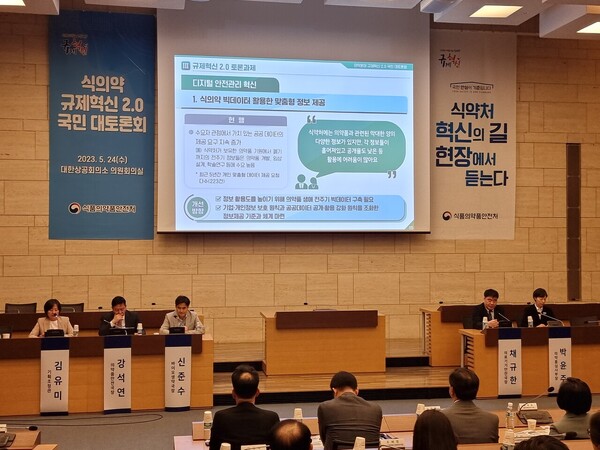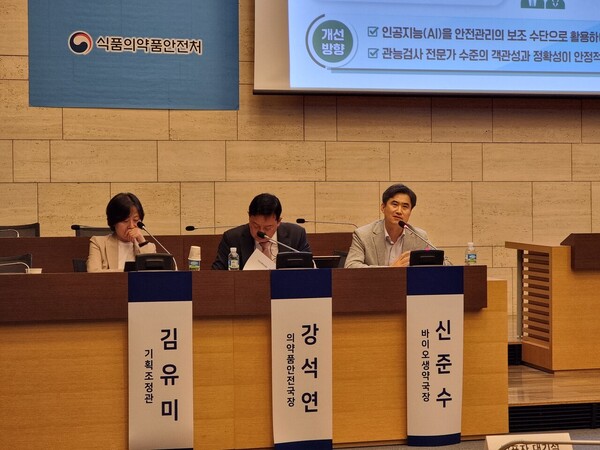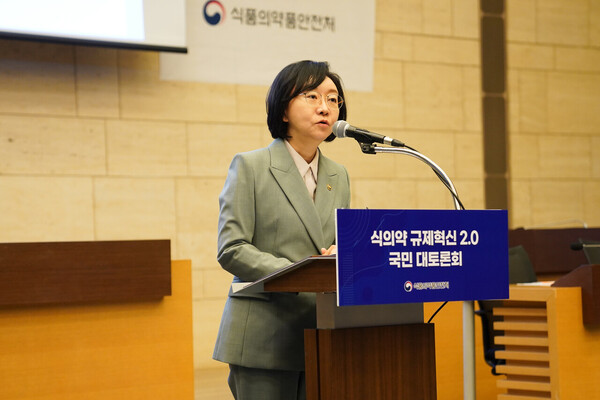“Don’t let the domestic industry get stuck in a regulatory rut and lag in competitiveness.”

On Wednesday, such calls poured out from the industry’s representatives at a public debate organized by the Ministry of Food and Drug Safety (MFDS) to innovate its regulatory systems.
Participants from the industry called for, among others, introducing hemp-based medicines and supporting the commercialization of high-tech biomedical products while discussing other industry issues, such as how to elevate the ministry’s international status.
During the debate’s question-and-answer session between the audience and director-general-level officials of the food and drug safety ministry, the representatives of the industry and patient groups requested the ministry to come forth more actively to introduce cannabis-based medical products into the country.
“We understand the ministry’s position to consider social consensus, but we are not saying the government should allow it because other countries do so,” said Kim Ha-won, CEP of Realplant, a special crop technology company. “Currently, the Korean cannabis industry’s competitiveness is suffering a massive setback.”
Kim strongly criticized the ministry, saying, “With credible organizations, like the United Nations and the World Health Organization, laying out precise standards and rationale for cannabis-based medicines, it is inappropriate for the MFDS to hide behind the pretext of ‘national consensus.’”
Kim acknowledged that the public remains negative about hemp-based medical products.
“However, it is also the role of the MFDS to present and persuade the public based on scientific evidence,” he said. “Please keep the promise to put the health of the public and patients ahead of all else.”
However, Kang Seok-yeon, director-general for the ministry’s Pharmaceutical Safety Bureau, said in response, “The atmosphere is not yet ripe for hemp-related discussions in Korea. Besides, the ministry supplies hemp-based medicine, Epidiolex, through the Korea Orphan and Essential Drug Center.”
“The government and MDFS are fully aware of the issue,” Vice Minister of Food and Drug Safety Kwon O-sang said. “The Ministry of SMEs and Startups oversees the Gyeongbuk Industrial Hemp Regulatory Free Zone, but the MFDS is also fully involved. The special zone demonstration project is scheduled until 2024, and we will decide the future direction by looking at the demonstration results.”
At the discussion, some participants also called for MFDC to push to conclude Mutual Recognition Agreement (MRA) with the European Medicines Agency (EMA).
“The EMA has MRAs with seven developed countries, including the U.S., Japan, and Canada, recognizing each other’s on-site inspection or exempting batch releases from national marketing authorization,” Samsung Biologics Managing Director Chin Yong-hwan said.
Chin cited Moderna’s Covid-19 vaccine as an example.
“At the time of the pandemic, there were no Moderna production plants in Japan,” he said. “In terms of distance and quality, Samsung Biologics was the best place to produce, but Korea was not a signatory to the MRA, so vaccines produced in Spain were supplied to Japan.”
Chin reiterated that Korea’s inclusion in the agreement would benefit the company and domestic biosimilar companies, such as Celltrion and Samsung Bioepis.
“Not only will it benefit our company, but it is also expected to have an economic ripple effect on the entire domestic biopharmaceutical manufacturing industry,” he added.
Biotech companies have also requested MFDS to develop next-generation biopharmaceuticals, such as microbiomes and exosomes.
"Korea is one of the world's three exosome technology leaders after the U.S. and China regarding publications and patent applications. It is very advanced in R&D, and many companies have been founded. However, it is not in clinical development for commercialization. There are no domestic clinical trials," MDimune CEO Bae Shin-kyu said. “We hope the MFDS will support the global commercialization of domestic technologies through rapid classification and regulation.”
In response, Park Yun-joo, director of the Drug Evaluation Department at the National Institute of Food and Drug Safety Evaluation, said, “We are revising the guidelines for quality, nonclinical and clinical evaluation of extracellular vesicular therapeutics. In addition, the institute operates a productization support group with a pre-consultation department. So, if you knock on the door, we will actively support productization.

Biopharmaceuticals and Herbal Medicine Bureau Director-General Shin Joon-soo said, “We have launched a biosimilar commercialization support group to help revitalize the industry. We are still working to create a second biosimilar. We will do our best to support the industry, despite difficulties such as a lack of manpower.”
Another participant requested to consider supporting in vitro diagnostic devices, which have driven the domestic medical device industry during the Covid-19 pandemic.
“Since the end of the pandemic, in vitro diagnostic device companies have been worried about their future,” said an official from Korea In Vitro Diagnostics Association. “The U.S. has the CLIA (Clinical Laboratory Improvement Amendment) Lab system in place, so it is possible to expand business through B2C. However, it is difficult to expand business in Korea because diagnosis is concentrated in hospitals.”
Medical Device Safety Bureau Director-General Chae Kyu-han replied, “We are thinking about how to manage diagnostic devices in the post-Covid-19 era and how to maintain the industry that has grown. Many changes will likely be needed in terms of policy. We will work on ways to revitalize it.”
In addition, those in the RA (Regulator Affairs) field in the audience also expressed their expectations and aspirations regarding the ongoing regulatory innovation project of MFDS.
"Regulation hasn't kept up with technological advances in the U.S. Food and Drug Administration, too. So, it formed task forces or ran innovation programs to explore new technologies,” said Sally Choe, head of the RA and clinical trial headquarters at SK Bioscience, recalling her experiences working at the FDA.
“We receive a lot of initiatives and ideas from the MFDS. However, despite its strengths, the agency faces significant challenges due to staff shortages,” Choe noted. “As a company, we will actively cooperate with the ministry in preparing the environment for the introduction of next-generation biopharmaceuticals.”

Besides, the ministry also presented various issues as subjects for discussion.
Among them are providing information on the status of domestic and foreign rare disease treatments, timely supply of rare and urgently introduced medical devices, establishing a liability insurance system for human implantable medical devices. promoting digital healthcare and wellness products, establishing a plan to approve self-driving electric wheelchairs, supporting the development of new drugs such as nanomaterials, establishing a support system for commercializing next-generation biopharmaceuticals, developing animal substitution test methods, harmonizing medical device GMP regulations, and simplifying GMP change determination for pharmaceutical manufacturing plants.
The ministry will finalize its Regulatory Innovation 2.0 tasks next month.

